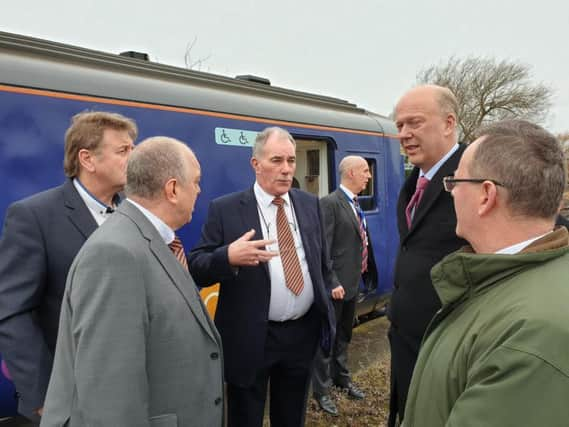Phasing of proposed Northumberland rail line explained after concerns raised


Transport Secretary Chris Grayling recently visited the county to take a ride along part of the route and hear more about the £190million plans for what’s now being called the Northumberland line, linking Ashington to Newcastle Central via Bedlington and Blyth.
It came as county councillors signed off on approximately £3.46million of spending to develop the next steps, with the aim of submitting an outline business case and proposal for the detailed design by the end of the year, and services planned to start in 2022.
Advertisement
Hide AdAdvertisement
Hide AdDuring a video interview with the Local Democracy Reporting Service during Mr Grayling’s visit, council leader Peter Jackson said that while the total cost of the project is estimated to be £190million, it can be broken down into phases with a £90million first phase being ‘perfectly achievable’ given the ‘billions being spent on HS2 and other projects in the south of England’.
This sparked questions from Labour councillors, who were concerned that the line will only be part-opened, but the Conservative leadership has now offered assurances that the phasing would simply hold back some of the infrastructure work and trains would still run all the way to Ashington.
Coun Deirdre Campbell, the Labour member for the Newsham ward through which the line will run, had described it as ‘extremely concerning news’, suggesting that perhaps the reason behind the dropping of the long-established Ashington, Blyth & Tyne name was ‘because the supposed phasing the council leader refers to means it will not reach Blyth, never mind Bedlington or Ashington’.
However, Coun Richard Wearmouth, the cabinet member for economic regeneration, said: “The ambition for the Northumberland line remains the same – an efficient, regular service from Ashington to the centre of Newcastle in around 35 minutes.
Advertisement
Hide AdAdvertisement
Hide Ad“It is disappointing some people seem determined to talk down the scheme and our communities in the south-east of the county.
“The current emerging funding opportunity, the Transforming Cities Fund, is time and funding-limited which means we wouldn’t be able to deliver the entire scheme within its time limits due to the nature of some of the works. Hence, a phased approach is being considered to get funding as soon as possible.
“The proposals would still run to Ashington, but hold back some of the infrastructure work to a following phase, this is the fastest route to a return of services and the economic benefit it would bring about.”
Labour also raised concerns about the cost of Mr Grayling’s visit – which featured a specially chartered train – to the council, particularly given that all of the currently identified stops on the line are in Labour-held wards and no opposition councillor was invited to the event.
Advertisement
Hide AdAdvertisement
Hide AdThey pointed out that the three Bedlington Independent councillors were on the trip despite the disused Bedlington station actually being in Labour councillor Jeff Gobin’s ward.
But Coun Wearmouth responded: “The cost of the train and refreshments were met by Northern as part of their franchise commitment to support us in delivering the scheme so there was no direct cost to the council.
“While this was a visit primarily for cabinet members and key partner stakeholders, as the train was stopping briefly in Bedlington, it was considered appropriate to invite some of the local councillors who were able to help emphasise what the scheme would mean for their town.”
Ben O'Connell, Local Democracy Reporting Service